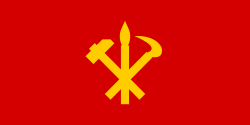3rd Congress of the Workers' Party of Korea

The flag of the Workers' Party of Korea
|
|
| Date | 23–29 April 1956 (7 days) |
|---|---|
| Location | Pyongyang, North Korea |
| Participants | 916 delegates |
| Outcome | Election of the 3rd Central Committee and 3rd Central Inspection Commission |
The 3rd Congress of the Workers' Party of Korea (WPK) was held in Pyongyang, North Korea, from 23–29 April 1956. The congress is the highest organ of the party, and is stipulated to be held every four years. 916 delegates represented the party's 1,164,945 members. The 3rd Central Committee, elected by the congress, reelected Kim Il-sung as WPK Chairman, and a number of deputy chairmen.
The 17th Plenary Session of the 2nd Central Committee decided on 3 December 1955 that the 3rd Congress would be held in April 1956, two months after the 20th Congress of the Communist Party of the Soviet Union (CPSU), in which de-Stalinization became the Soviet Union's official policy.Choe Yong-gon, a partisan close to Kim Il-sung, attended the 20th Congress and reported on its activities personally to Kim Il-sung when he returned. After being told of the new Soviet policy, Kim Il-sung reacted swiftly; in his first speech after the CPSU congress he told WPK members that they needed to curtail the powers of a single leader by establishing a collective leadership. Kim Il-sung went on to chastise former figures such as Pak Hon-yong and Yi Sung-yop who, he claimed, had exerted "individual heroism" and failed to follow collective leadership procedures. However, this was just talk, and no one related the discussion about collective leadership to Kim Il-sung's power concentration at the top; he held the highest party office, the WPK chairmanship, and the highest state office, as head of government. In a similar vein, Kim Il-sung did not refer to the Soviet Union's de-Stalinization policies by name and did not criticize Joseph Stalin's leadership; however, he had no problem criticizing the activities of people close to Stalin; Vyacheslav Molotov, Lazar Kaganovich, Georgy Malenkov and Nikolai Bulganin for instance.
...
Wikipedia
